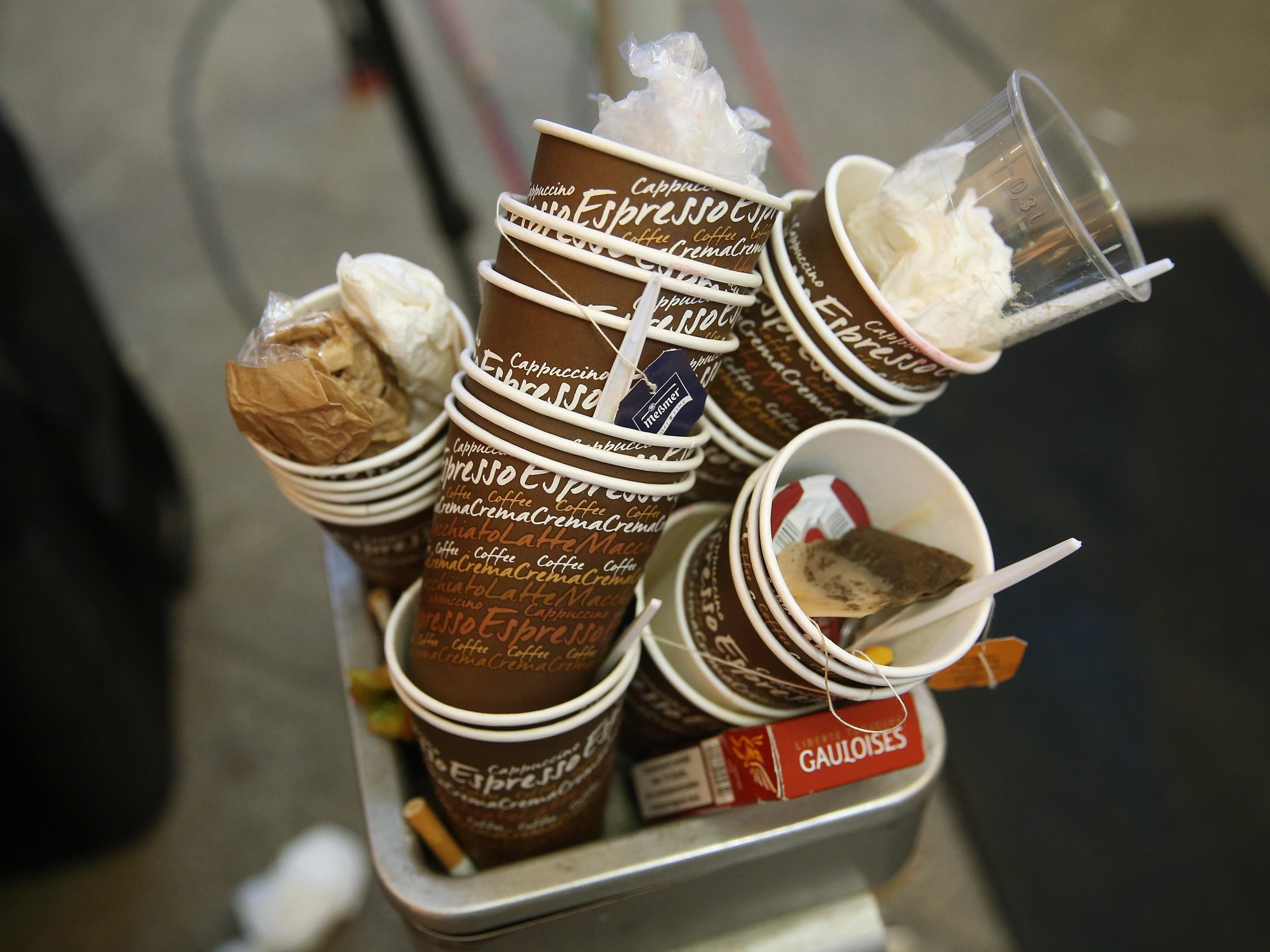Michael Gove must not let the 'latte levy' go cold
By failing to accept the Environmental Audit Committee’s recommendation for tackling coffee cup waste the Government is acting against the available evidence


Over the last 10 years we have gone from being a nation of tea drinkers to a nation of coffee lovers. Cold-pressed, slow-roasted, skinny mocha, soy lattes – we have embraced the infinite varieties of coffee. But whatever your choice, they all have one inconvenient thing in common. They often come in cardboard cups with a plastic liner. And though most people pop them in a recycling bin, fewer than 1 in 400 cups is recycled.
Over 2.5 billion disposable coffee cups are land-filled, littered or incinerated in the UK every year – enough to stretch around the world five and a half times. Coffee chains and supermarkets have ignored the problem. Some offer a discount if you bring a reusable cup, but they account for just 1-2 per cent of coffee sales.
That was why a 25p charge or “latte levy” on single-use cups was the top recommendation to drive up recycling and reduce waste made by the cross-party Environmental Audit Committee in January. We wanted to nudge coffee drinkers to realise that their cups took 5 seconds to make, 5 minutes to use, and 500 years to biodegrade in landfill. The Independent’s Cut the Cup Waste campaign has further highlighted the need for change.
Responding to our report this week, however, the Government poured cold water on the levy idea, saying only that it was “something we could consider amongst other policy options”.
This tepid response is not good enough. We know a charge would work. The 5p plastic bag charge is proof, with 9 billion fewer bags used since it was introduced two years ago.
Charges are more effective than discounts at changing consumer behaviour because we respond better to avoiding a loss than gaining a reward. Industry is interested. The early results from Starbucks, who have introduced a 5p cup charge in 35 central London coffee shops, are very encouraging. We know consumers support the idea, as shown by The Independent’s recent poll – they want government to help them do the right thing and protect the planet.

The levy is an important first step to a fundamental redesign of the UK’s packaging system. Packaging recovery notes are intended to make companies show their products are recycled after use, but we saw evidence that they are distorting the market in favour of waste exports rather than reprocessing in the UK. That is why we have asked the National Audit Office (NAO) to investigate the system and the 200 firms which offer these notes. We want the NAO to follow the money, because we found it difficult to see where it went, with very little money going to cash-strapped councils who deal with litter collection and recycling.
A ban on sending our contaminated paper and plastics to China, the world’s largest waste importer, started in January and has caused the price of recyclable paper and plastic to tumble from £80 a tonne to £20. Millions of extra tonnes of waste a year could remain on UK shores, either going to landfill or energy from waste.
We are stockpiling poor-quality paper and plastic waste in the UK. The chief executive of a large recycling company told me this week that his company has shut down recycling and reprocessing plants and reopened landfills in the wake of the ban, as the global market price for recyclate has collapsed. English recycling rates, which had plateaued, could now start to fall. And who will bear the costs? Council-tax payers.
Nobody wants higher council tax and more landfill. Which is why the Government must act and redesign the waste and resources system from start to finish – from product design to end market. In the meantime the latte levy would reward reuse and ensure the polluter pays.
Blue Planet 2 has shown us how plastic finds its way into our rivers and seas, choking fish and seabirds. A ban on manufacturing plastic microbeads came into effect in January, a ban that my committee recommended in 2016. A few years ago, microbeads were dismissed as a bottom-of-the-pile issue, but the public rightly demanded action. We only have one ocean, connecting all countries. When we throw things away, there is really no such place as “away”.
We have had a lot of warm words from the Government on tackling plastic, with a tax on single-use plastics announced in the Budget. Four months later, the consultation hasn’t even begun.
Last month, Theresa May launched the Government’s 25-year environment plan, but its aim to end avoidable plastic waste by 2042 is just froth.
The Cabinet has been issued with reusable bamboo cups for the cameras, Michael Gove wants to ban plastic straws, some Tory MPs have given up plastic for Lent. Without a joined-up strategy this is gesture politics. We need policy, not piety, to turn back the plastic tide.
Mary Creagh is MP for Wakefield and chairs the cross-party Environmental Audit Committee
Join our commenting forum
Join thought-provoking conversations, follow other Independent readers and see their replies
Comments
Bookmark popover
Removed from bookmarks